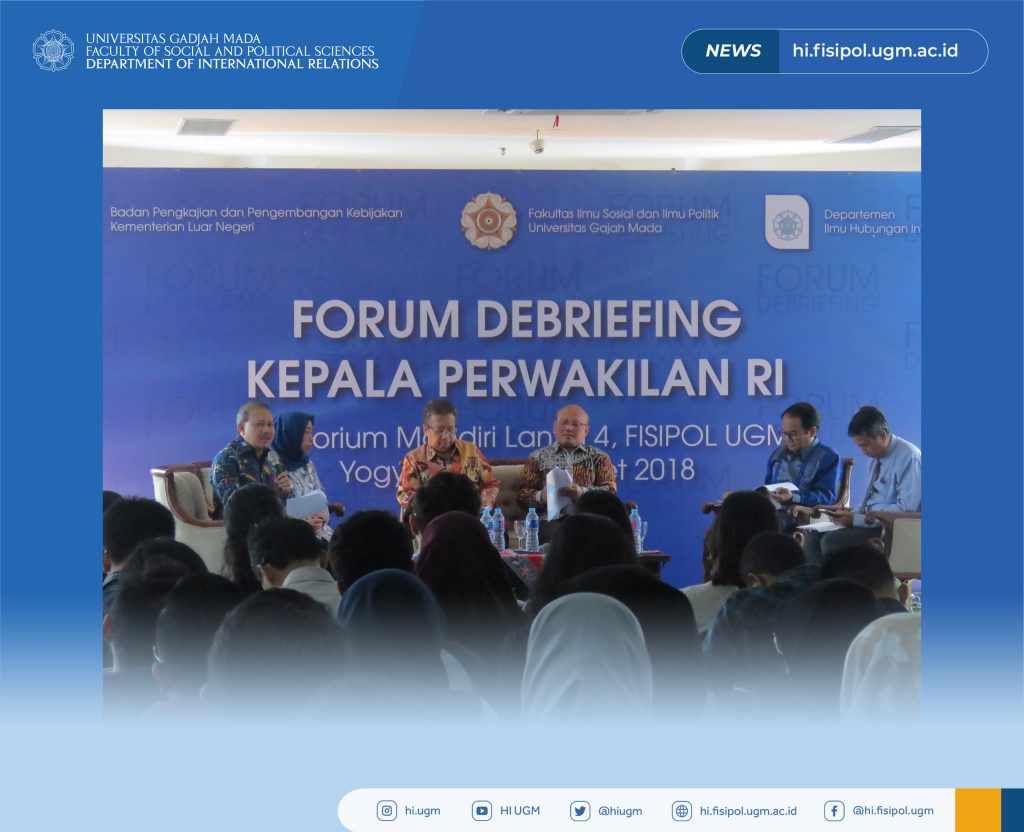Department of International Relations Universitas Gadjah Mada (DIHI-UGM) in collaboration with the Policy Analysis and Development Agency (BPPK), Ministry of Foreign Affairs Republic of Indonesia held the 2nd Debriefing Forum with Indonesian Ambassadors at Auditorium Mandiri FISIPOL UGM (12/3). The forum focused on Indonesian effort to Develop Partnership Framework through Bilateral, Regional and Multilateral Relations. It was attended by around 250 participants that consisted of lecturers and students from campuses around Yogyakarta, researchers and representatives of government office.
The forum, organized bimonthly by the BPPK, serves as a dissemination event for ambassadors whom freshly done their assignment to share their experiences. Although it is regularly held, it was the first time DIHI UGM has been chosen as a host.
Dr. Wawan Mas’udi, Vice Dean of Academic and Student Affairs opened the four hours forum. Acting as moderator was Drs. Eko Hartono, MPP, the secretary of BPPK. The first presentation was delivered by Dra. Yuli Mumpuni Widarso, Indonesian Ambassador to Spain and United Nations World Tourism Organization (UNWTO).
In the occasion, Dra. Yuli Mumpuni Widarso explained her experience working and practicing diplomacy in international forums, especially related to tourism. She suggested that Indonesia could learn from Spain especially in developing its tourism sector. Spain has been able to multiple its visitors to 11 million people, despite the crisis happened in recent years. It was achieved through many initiatives by the Mayor of Madrid who had maximized all sectors to support the city tourism including 45 potential sites protected by UNESCO.
Spain attempted to push each provincial governments to develop more specialized tourism. For example, there was a province focused on ecotourism while other developed wine where tourists could pick grapes and made their own wine. In order to maximize the country’s revenue from tourists, Spanish government also applied shopping tourism where foreign tourists were given 100 euros voucher. Many sectors, including SMEs were included in the strategy and they supported it. Such strategies could be applied in Indonesia. However, there are still many regions depending on the central government which lessen possibility to implement these strategies.
Drs. Suprapto Martosetomo, the Indonesian Ambassador to South Africa and the Kingdom of Lesotho, the Kingdom of Swaziland and the Republic of Botswana, pointed out potential opportunity for Indonesia to cooperate with South Africa as it has improved their economic and trade profiles. Drs. Suprapto admitted that there has been Memorandum of Understanding (MoU) on trade between South Africa and Indonesia as the effort to reduce tariffs for Indonesian product.
On another session, Drs. Burhanuddin, Indonesian Ambassador to Sudan and Eritrea explained the country where he posted was no longer in conflict as it was although there were difficulties in rebuilding and developing caused by United States economic sanction and troubling relations to neighboring countries due to history. However, Sudan is trying to reconcile with Chad and Libya.
“Indonesian Embassy in Sudan ensures all Indonesian citizens are protected,” said Dr. Burhanuddin. There are approximately 2.000 Indonesian students and 700 Indonesian workers living in Sudan.
Meanwhile, in Libya there are around 500 Indonesian explained by the Indonesian Ambassador to Libya, Raudin Anwar, S.H. LL.M. Unlike Sudan whom security has been improving, Libya has not been fully secure after the revolution. Several conflicts and wars happened following the revolution because of Libya’s abundant natural resources such as oil and natural gas with relatively small amount of population which is only 6.1 million inhabitants.
Bilateral relations between Indonesia and Libya have just begun around 2001. Each year their relations are getting stronger mainly with socio-cultural cooperation such as scholarships programs for Indonesian and Libyan students.
Translator: Willibrodus Bintang

